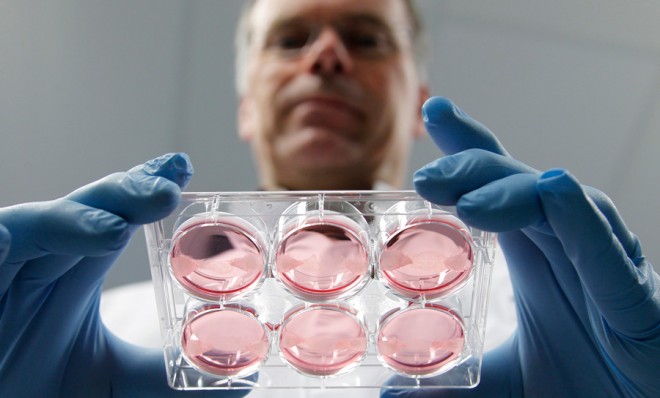The advantages of a lab-grown hamburger
In-vitro beef. It's what's for dinner?

In the future you may be able to sink your teeth into a salty, meaty burger in good conscience, thanks to in-vitro innovations dreamed up by Mark Post, head of physiology at Maastricht University in the Netherlands.
About two years ago, Dr. Post set out to create a real hamburger assembled from tiny slivers of muscle tissue grown entirely in a petri dish — no cows, moos, or slaughterhouses required. Post says the gelatinous-looking flesh he has created — and ingested — actually tastes "reasonably good."
In a few weeks, The New York Times reports, Post plans on showcasing his lab-grown meat — seasoned with salt and black pepper only — in a London cook-off. He's hosting the contest in hopes of attracting a new round of investors. "Let's make a proof of concept, and change the discussion from 'this is never going to work' to, 'well, we actually showed that it works, but now we need to get funding and work on it,'" Dr. Post tells the Times.
The Week
Escape your echo chamber. Get the facts behind the news, plus analysis from multiple perspectives.

Sign up for The Week's Free Newsletters
From our morning news briefing to a weekly Good News Newsletter, get the best of The Week delivered directly to your inbox.
From our morning news briefing to a weekly Good News Newsletter, get the best of The Week delivered directly to your inbox.
The funding will be necessary to continue the early-stage experiment, but make no mistake, Post has done plenty of work already. Growing a hamburger patty in a lab is every bit as tedious as it sounds: First, muscle cells extracted from a cow's neck are coaxed into connective tissue in a fetal calf serum, which will have to be replaced by a product of non-animal origins for the future. Each five-ounce burger is then meticulously assembled from 20,000 thin strips of muscle tissue. (Think tiny, sliced eraser ends.) The test-tube burger isn't quite McDonald's-ready yet: As The Week has previously reported, the burger itself costs $325,000 to produce, with funding so far coming from an anonymous investor.
The potential economic and environmental pay-off could be huge, though: As Post notes, worldwide meat consumption is expected to double in the next 40 years. "In my mind, meat consumption is hear to stay," Post tells ABC News, "and if you want to do that at a higher efficiency than what is currently done by cows and pigs, you have to explore the possibility of doing that in a lab."
Numerous studies have highlighted the looming ecological disaster presented by raising cattle on a global scale. A 2006 United Nations report found that the meat industry generates "more global-warming greenhouse gases, as measured in CO2 equivalent, than transportation." Per the U.N.:
When emissions from land use and land use change are included, the livestock sector accounts for 9 percent of CO2 deriving from human-related activities, but produces a much larger share of even more harmful greenhouse gases. It generates 65 percent of human-related nitrous oxide, which has 296 times the Global Warming Potential (GWP) of CO2. Most of this comes from manure.
And it accounts for respectively 37 percent of all human-induced methane (23 times as warming as CO2), which is largely produced by the digestive system of ruminants, and 64 percent of ammonia, which contributes significantly to acid rain. [UN.org]
Post isn't alone in his quest to create more humane meat with dramatically lower carbon footprint. In 2012, Peter Thiel's foundation donated $350,000 to a start-up named Modern Meadow, which seeks to use a biological 3D-printer to print, well, steaks.
A free daily email with the biggest news stories of the day – and the best features from TheWeek.com
What about you? Would you try a lab-grown hamburger (especially if you're vegetarian)? Let us know in the comments below.
-
 Political cartoons for January 24
Political cartoons for January 24Cartoons Saturday's political cartoons include 3D chess, political distractions, and more
-
 Ryanair/SpaceX: could Musk really buy the airline?
Ryanair/SpaceX: could Musk really buy the airline?Talking Point Irish budget carrier has become embroiled in unlikely feud with the world’s wealthiest man
-
 Claudette Colvin: teenage activist who paved the way for Rosa Parks
Claudette Colvin: teenage activist who paved the way for Rosa ParksIn The Spotlight Inspired by the example of 19th century abolitionists, 15-year-old Colvin refused to give up her seat on an Alabama bus